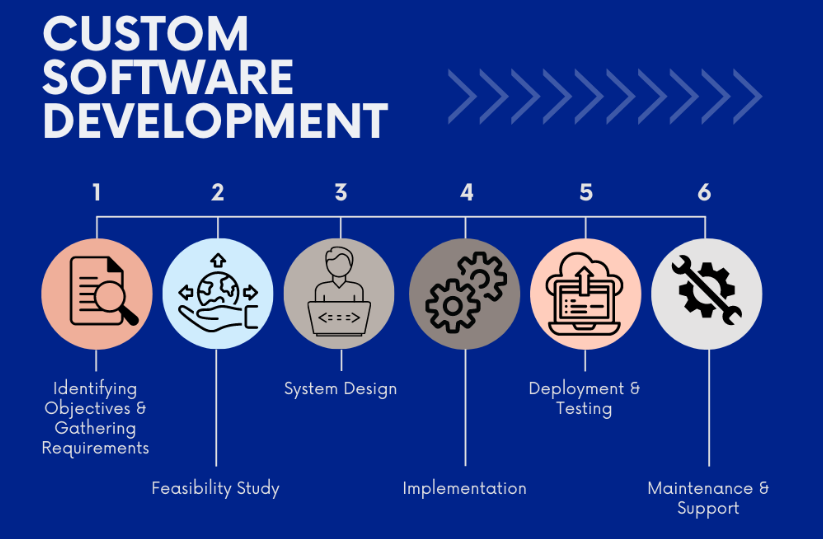Unlocking Business Potential:10 The Vital Role of Custom Software
In the fast-evolving landscape of modern business, one key factor sets successful enterprises apart from the rest: adaptability. Among the array of tools available to companies, custom software stands out as a cornerstone for achieving adaptability and maximizing efficiency. This tailored approach to software development can revolutionize the way a business operates, delivering unique solutions finely tuned to its specific needs and goals.
Table of Contents
ToggleUnderstanding Custom Software
Tailored Solutions for Enhanced Efficiency
One of the most significant advantages of custom software is its ability to streamline operations. Off-the-shelf solutions often come with unnecessary features or lack essential functionalities, leading to inefficiencies and workarounds. software, on the other hand, is designed with precision, ensuring that every component aligns seamlessly with the business’s workflows. This alignment minimizes time-consuming manual processes, reduces errors, and boosts overall productivity.
Scalability and Flexibility
Another compelling reason for businesses to opt for custom software is scalability. As a company grows, its needs evolve. software is built with scalability in mind, allowing for easy adaptation and expansion as the business requirements change. This flexibility ensures that the software remains an asset rather than a limitation, accommodating increased data volumes, user numbers, or additional features without significant disruptions.
Competitive Edge through Innovation
In today’s competitive market, innovation is the driving force behind success. Custom software empowers businesses to innovate by providing tools and functionalities that cater specifically to their unique strategies. Whether it’s creating a customer-centric app, streamlining internal processes, or integrating cutting-edge technologies like AI or IoT, custom software enables businesses to differentiate themselves and stay ahead of the curve.
Cost-Effectiveness in the Long Run
While the initial investment in custom software development might seem daunting, it often proves to be a cost-effective choice over time. Off-the-shelf software might entail licensing fees, regular updates, and additional costs for features that aren’t needed. Custom software, however, eliminates these unnecessary expenses by providing exactly what’s required, reducing reliance on multiple tools, and minimizing ongoing maintenance costs.
Enhanced Security and Control
Security breaches and data leaks are significant concerns for businesses. Custom software development allows for a robust security infrastructure tailored to the organization’s specific needs. With greater control over security measures and the ability to implement stringent protocols, businesses can safeguard sensitive information more effectively than with generic software solutions.
Enhanced User Experience
Custom software places emphasis on user-centric design, ensuring that interfaces are intuitive and user-friendly. This focus on user experience leads to increased employee satisfaction, smoother workflows, and ultimately, higher productivity.
Integration and Compatibility
Off-the-shelf software often presents compatibility issues when integrating with existing systems. Custom software, however, can be built to seamlessly integrate with current infrastructure, eliminating data silos and fostering a more cohesive environment for operations.
Analytics and Reporting
Tailored software solutions can incorporate advanced analytics and reporting features, providing businesses with deep insights into their operations. These insights empower informed decision-making, allowing companies to identify trends, foresee challenges, and capitalize on opportunities more effectively.
Regulatory Compliance
Different industries face varying regulatory requirements. Custom software can be designed with specific compliance measures in mind, ensuring that the business adheres to industry standards and regulations without compromise.
Support and Maintenance
Unlike off-the-shelf software where updates and support are subject to the vendor’s timeline, custom software offers the advantage of dedicated support and maintenance. This ensures prompt assistance and swift resolution of issues, minimizing downtime and maximizing operational efficiency.
Branding and Identity
Custom software can be tailored not only to fit operational needs but also to reflect the brand’s identity. From visual elements to functionality, the software can align with the company’s branding strategy, enhancing brand recognition and customer engagement.
Adaptation to Changing Needs
Business landscapes are dynamic, and so are business needs. Custom software is inherently adaptable, allowing for rapid adjustments and updates to meet evolving requirements, market trends, and customer expectations.
Customer-Centric Solutions
For businesses engaging directly with customers, custom software facilitates the creation of personalized experiences. Whether it’s through customized interfaces or tailored service offerings, businesses can forge stronger connections and foster loyalty among their customer base.
Long-Term Investment and ROI
While the upfront cost of custom software might seem higher, the return on investment (ROI) over the long term can be substantial. Increased efficiency, reduced operational costs, improved productivity, and the ability to capture new opportunities contribute to a significant ROI.
Conclusion
In a rapidly evolving business landscape, the adaptability, efficiency, and competitive edge provided by custom software are invaluable assets. By investing in tailor-made solutions that align precisely with their operations and goals, businesses can streamline processes, drive innovation, and position themselves as industry leaders. Custom software isn’t just an expense—it’s an investment in the future success and growth of a business.

